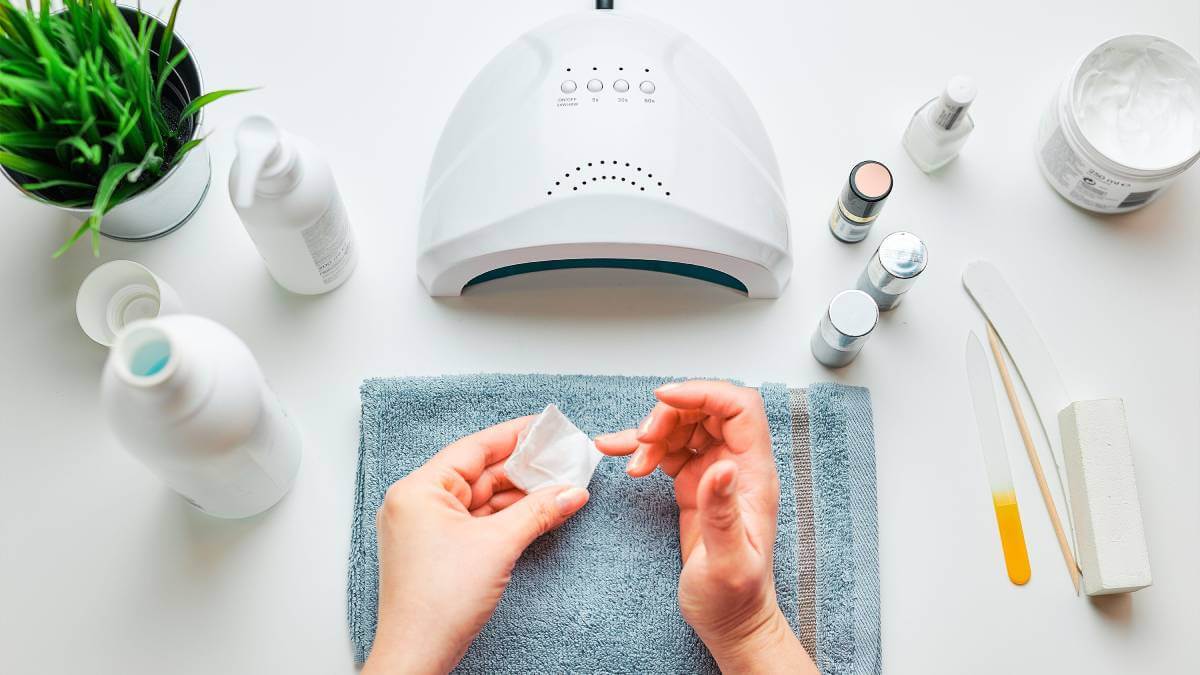While looking for ways to cut spending on luxuries, consumers have embraced DIY beauty during the cost-of-living crisis.
One survey of beauty search terms found that ‘how to do gel nails at home’ was the most in-demand pampering technique with nearly 180,000 searches a year, ahead of fake tanning (101,280) and acrylic nails (85,320).
View this post on Instagram
With UV lamps costing around $100 and polishes from top brands such as Essie, OPI and Shellac around $20 each, doing your own gel mani is cheaper in the long run than paying upwards of $45 for every salon visit.
But can you replicate a nail technician’s precision and ensure a long-lasting finish?
We asked nail pros for their tips on how to master a gel manicure at home.
Prep your nails

“Good natural nail prep before applying gel polish can be the difference between a polish that lasts weeks and a polish that is likely to chip and peel prematurely,” says manicurist Tinu Bello.
Start by gently pushing back your cuticles (use cuticle remover gel if they’re very dry or hard) then clipping off the excess.
Ms Bello explains: “Cuticles are dead pieces of skin that attach to the nail plate at the base of the nail. Once removed, you will find that gel polish adheres to the nail much more smoothly.”
Buff away shine
“After shaping your nails in your desired shape, your nail plate should be lightly etched using a soft buffer file,” says Julita Fagan, manicurist and nail expert for 14 Day Manicure.
“This helps to remove the natural shine or oils from your nails, assisting in product adhesion.”
Avoid moisture
View this post on Instagram
With a regular manicure, the technician might soak your fingertips to soften the cuticles, but with gel polish you want to keep your nails dry.
“It’s important to avoid using water on the nails or any products that contain moisture or oil prior to applying gel polish, such as hand soap or moisturiser,” says Ms Bello.
“Fingernails quickly absorb water and expand, meaning nails that have been painted post-soak will contract once dry and cause polish to chip.”
Apply a primer
Gel products and kits vary so you must follow the instructions carefully, but if you can use a primer your polish is likely to last longer.
“Applying a nail primer before your base coat will act as a bonding element between your natural nails and the product,” says Ms Fagan.
“This is particularly useful if you continuously experience chipping or lifting of your gel polish.”
Paint precisely

When applying polish it’s crucial to only paint the nail, not the cuticle.
“A trick in ensuring a seamless polish application is to leave the tiniest gap between your cuticles and the first one or two layers of your gel polish, getting as close as possible to your cuticles on your last layer,” says Ms Fagan.
“This will ensure a less bulky finish at the end of your application.”
She also recommends ‘capping’ the polish by applying the top coat over the tip of the nail to seal in the colour.
Try builder gel
View this post on Instagram
As an additional defence against chipping, add a layer of extra-strength builder gel to your mani, which comes in clear or a range of colours.
“Builder gel is a stronger consistency than the standard gel polish,” explains Ms Fagan.
“Using it at the end of your gel polish application, prior to top coat, will provide even more longevity to your manicure.”
Do you paint your own nails at home? Have you ever tried gel nails? Let us know in the comment section below.
Also read: Seven simple ways to keep nails strong and healthy in winter
– With PA

